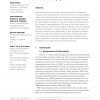Free Online Productivity Tools
i2Speak
i2Symbol
i2OCR
iTex2Img
iWeb2Print
iWeb2Shot
i2Type
iPdf2Split
iPdf2Merge
i2Bopomofo
i2Arabic
i2Style
i2Image
i2PDF
iLatex2Rtf
Sci2ools
112
click to vote
PRESENCE
2006
2006
An Investigation of Collective Human Behavior in Large-Scale Mixed Reality Spaces
Future mixed reality systems will need to support large numbers of simultaneous, nonexpert users at reasonable per-user costs if the systems are to be widely deployed within society in the short to medium term. We have constructed a prototype of such a system, an interactive entertainment space called Ada that was designed to behave like a simple organism. Using Ada we conducted two studies: the first assessing the effect of varying the operating parameters of the space on the collective behavior and attitudes of its users, and the second assessing the relationships among user demographics, behavior, and attitudes. Our results showed that small changes in the ambient settings of the environment have a significant effect on both user attitudes and behavior, and that the changes in user attitudes do not necessarily correspond to the environmental changes. We also found that individual user opinions are affected by demographics and reflected in overt behavior. Using these results, we pro...
| Added | 14 Dec 2010 |
| Updated | 14 Dec 2010 |
| Type | Journal |
| Year | 2006 |
| Where | PRESENCE |
| Authors | Kynan Eng, Matti Mintz, Tobi Delbrück, Rodney J. Douglas, Adrian M. Whatley, Jônatas Manzolli, Paul F. M. J. Verschure |
Comments (0)

